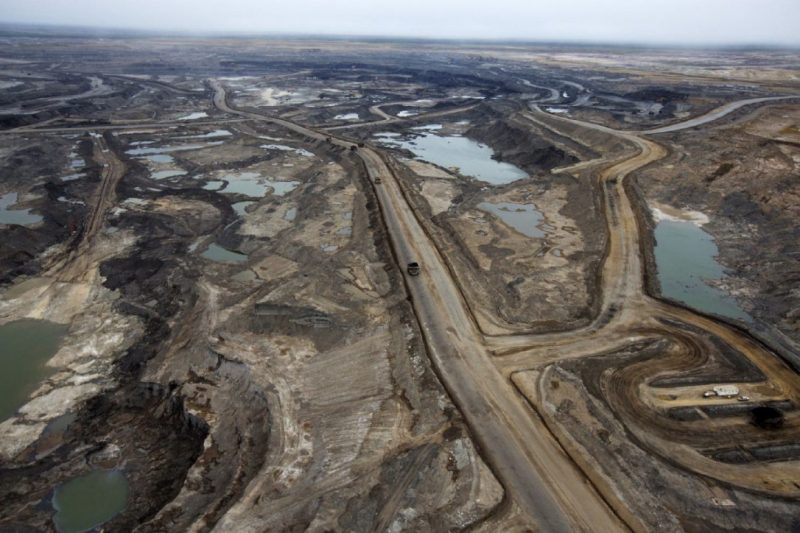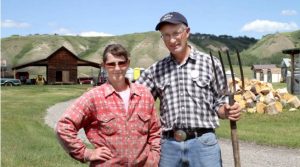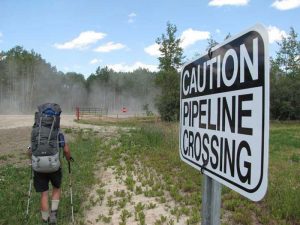#174 Lights, camera, action, debate
September 29th, 2017
Documentaries about Alberta’s tar sands between 2004 and 2014 have helped and hindered public debate.
Geo Takach’s critical responses to eco-documentaries include three made by B.C. filmmakers: Todd McGowan & Frank Wolf; Charles Wilkinson; and David Lavallee.
REVIEW: Tar Wars: Oil, Environment and Alberta’s Image
by Geo Takach
The University of Alberta Press, 2017.
$34.95
978-1-77212-140-7
Reviewed by Nichole Dusyk
*
In the first pages of Tar Wars, Geo Takach of Royal Roads University repudiates his own title and coins the term “bit-sands” to refer to the three vast stretches of bituminous deposits in Alberta: the Peace River, Athabasca, and Cold Lake oil sands.
Takach’s avoidance of the two existing but contentious terms – the historical “tar sands” and the sanitized “oil sands” — is a discursive tactic that reveals his purpose: to depolarize and ultimately enable debate of the bit-sands and their role in defining Alberta.
Tar Wars is thus a sequel of sorts to his previous book, Will the Real Alberta Please Stand Up (University of Alberta Press, 2010), which offered a humorous portrait of the province, poking fun at social, media, and political images and stereotypes while also demonstrating its cultural complexity.
A more serious and scholarly endeavor than its predecessor, Tar Wars explores images of Alberta by analyzing visual representations of the bit-sands in the work of documentary filmmakers and professional communicators working independently, for the oil industry, the Alberta government, and for television networks, including the CBC.
Specifically, Takach examines documentary films produced between 2004 and 2014, when the resource entered the public consciousness in Canada and abroad through environmental documentaries like Petropolis (2009) and Pipe Dreams (2011), and through industry campaigns like Canada’s Oil Sands: Come See for Yourself (2010).
This book is particularly relevant to B.C. because of the protracted controversy over the Trans Mountain pipeline and the Northern Gateway pipeline (now cancelled) — both of which proposed shipping diluted bitumen to the B.C. coast where it would be loaded onto tankers for export.
Takach considers the work of several B.C. filmmakers, for example the eco-documentary by Todd McGowan and Frank Wolf, On the Line: Walking the Northern Gateway Pipeline Route, Charles Wilkinson’s documentary Peace Out, and David Lavallee’s White Water, Black Gold, all from 2011.
Tar Wars thus captures the emergence of the deeply polarizing tug-of-war between images that frame the bit-sands as an economic boon made possible by human ingenuity and the marvels of technology, or as an ill-judged venture leading to ecological and humanitarian disaster.
Takach adds depth to his analysis by including interviews with filmmakers that explore the intent and limitations of film production and position the films in dialogue with one another. Although few of the films intentionally address Alberta’s identity, the “discursive frames” Takach identifies implicitly construct the province and its people as pro- or anti-sands.
These images conjure Alberta as a secure, responsible, and even clean oil producer — or conversely as a global bully set on developing the bit-sands at any cost.
These polarized frames permeate political discourse and disable productive dialogue by creating a climate where, for the oil industry and Alberta government, to question the bit-sands is to be anti-Albertan since, as the oil industry would frame it, “Alberta is energy.”
On the other side, Albertans are portrayed as blissfully ignorant or willfully blind as they sell their souls (and their province) to extractive capitalism.
Takach asserts that both extremes limit debate and fail to reflect the values or lived experience of the majority of people in the province.
Many of the visual images discussed are so familiar and well-worn — open pit mines, giant yellow 400-ton Komatsu dump trucks, golden wheat fields, majestic views of the Rockies – that one does not need to have seen films to make sense of the analysis.
Takach’s approach is thorough and innovative. He explains the visual discourse and then peels it back to expose the implications of reducing Alberta to a series of scenic photographs — or to their opposite.
Takach is concerned with representations of Alberta, particularly how the identity and image of the province play out politically in the rest of the country. He also situates the discourse in the context of national politics and global events and against the work of political economist and historian Harold Innis.
However, speaking as a reader who was born and raised in Alberta, I suspect his primary audience is actually Albertans themselves. This analysis explains to me, as a former Albertan, the dominant cultural imagery of Alberta, as well as my own ambivalence and disengagement with Alberta politics: the polarized debate fails to match my lived experience of Alberta and I find little opportunity to productively engage.
It is at this point of resonance that Takach’s project is ultimately most urgent — to combat political apathy and disengagement within Alberta. His solution is to devise a more realistic, balanced, and forward-looking imagery so that Albertans do not fall prey to an antagonistic, binary, “us-or-them” mentality and to open up space for constructing collective identities that better represent the province and resonate with its people.
Amidst the frustrating lack of productive dialogue surrounding bit-sands development and the pipelines that support it, Tar Wars highlights two points that are seldom part of the discussion.
The first is that while the antagonistic “Alberta is energy” approach originated with industry and political leaders, the polarizing rhetoric does not represent the views of all or even the majority of Alberta residents. The second is that polarized debate limits meaningful dialogue and political engagement.
While perspectives on the bit-sands and the building of pipelines differ between B.C. and Alberta, what can be taken from Tar Wars is a rationale for continued engagement and public debate. Underlying is Takach’s message that we must refuse to fall into easy stereotypes of any region, including the one we live in.
*
Nichole Dusyk is a postdoctoral fellow at Simon Fraser University whose research focuses on the intersection of energy governance and participatory politics especially as it relates to knowledge production, public engagement, and environmental identities. Her work has included studies of municipal energy planning, large-scale hydroelectricity, wind energy, and bitumen pipelines. After more than a decade in Vancouver, she has relocated to Ottawa where she lives, works, and tries to maintain her west coast perspective.
*
The Ormsby Review. More Readers. More Reviews. More Often.
Reviews Editor: Richard Mackie
Reviews Publisher: Alan Twigg — BC BookWorld / ABCBookWorld / BCBookLook / BC BookAwards / The Literary Map of B.C. / The Ormsby Review
The Ormsby Review is a new journal for serious coverage of B.C. literature and other arts. It is hosted by Simon Fraser University. The Advisory Board consists of Jean Barman, Robin Fisher, Cole Harris, Wade Davis, Hugh Johnston, Patricia Roy, David Stouck, and Graeme Wynn.
“Only connect.” – E.M. Forster








Leave a Reply